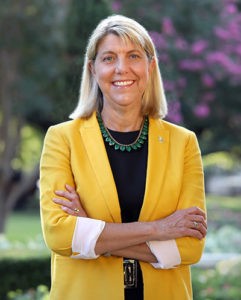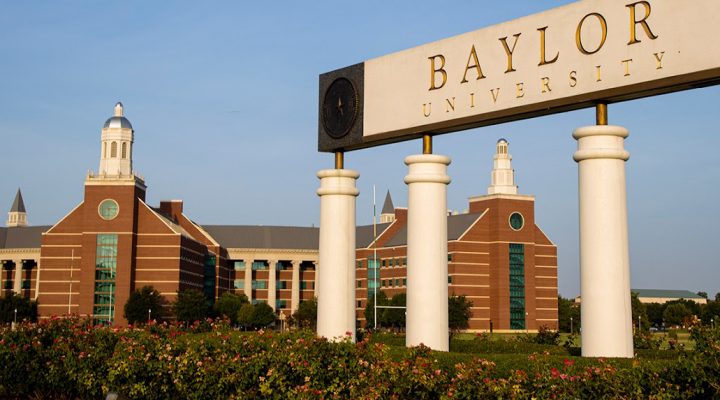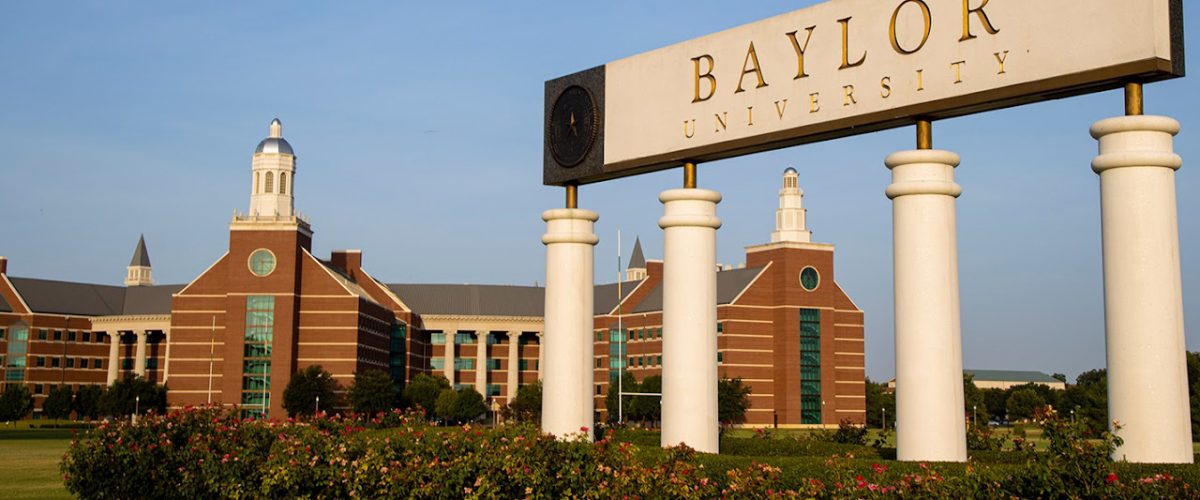In a move that reflects the increasing diversity of its student body, Baylor University has changed its bylaws to allow more non-Baptists to sit on the world’s largest Baptist University’s board of regents.
Baylor President Linda Livingstone and regents Chair Bill Mearse announced the bylaw change in a joint statement.
“First and foremost, we will ensure that our beloved Baylor University continues to be governed by a majority Baptist and entirely Christian board,” Livingstone’s and Mearse’s statement said.
The change reduces the allotment of regents who are active members of Baptist churches from 75% to 67%.
“This change permits the board to recruit from a broader pool of highly qualified Christian leaders to serve as regents,” the statement said. The change also “continues the progress made to date toward a board that is as broadly experienced and diverse as its student, faculty and staff populations.”
The bylaw change surfaced in a recommendation made by the university’s Governance Review Task Force in 2022, Livingstone and Mearse said.
“We agree with the task force … that the Baylor board will be best served by a more representative group of regents that continues to include strong Baptists,” they noted. But the new structure offers “increased flexibility to incorporate other Christian leaders, including from outside Texas and internationally, given Baylor’s worldwide impact as a Research 1 university.”
Livingstone and Mearse cited shifting “demographics within Protestant Christianity — particularly within the Baptist denomination” — as a partial reason for altering the board composition. “Membership in Baptist-affiliated churches across the country and within the Baptist General Convention of Texas is declining,” they said. Baylor, located in Waco, historically has been affiliated with the Texas convention.
More than 20% of Baylor’s undergraduate students identify as nondenominational, followed by 19% Baptist and 16% Catholic.
Simultaneously, Baylor’s student body has grown more diverse. Livingstone’s and Mearse’s statement noted “more than 20% of Baylor’s undergraduate students identify as nondenominational, followed by 19% Baptist and 16% Catholic.”
Data provided by Jason Cook, vice president for marketing and communications, shows the religious identification of 15,155 undergraduate students during the 2023-24 academic year:
- 3,055 nondenominational
- 2,874 Baptist
- 2,426 Catholic
- 1,999 Christian (no affiliation)
- 1,037 No religion specified
- 714 Methodist
- 419 Other
- 398 Presbyterian
- 332 No religion
- 327 Lutheran
The composition of Baylor’s governing board — for decades entirely selected by the Baptist General Convention of Texas — has evolved over the past three decades.
In 1990, concerned about the rise of fundamentalism that had taken over the Southern Baptist Convention, Baylor shifted to an independent board of regents, whose members were selected by the board itself.

Linda Livingstone (Photo/Baylor)
All members still were required to be Baptists. The BGCT had the opportunity to nominate up to 25% of the members, but their ultimate appointment rested with the board. Through the intervening years, that nomination/appointment process has been “collaborative in nature,” Cook said.
In 2011, the board dropped the 100% Baptists requirement to 75%.
Along the way, the regents have opened membership to representatives from several specific groups:
- Two faculty members and two students sit on the board, serving two-year terms. Second-year members have voting privileges.
- At least three slots and not less than 10% of all voting memberships are held by alumni-elected regents. Any Baylor alumnus is eligible for one of these slots, after receiving a nomination signed by at least 50 fellow alums or a nomination through one the university’s advisory boards.
- Both the “B” Association, the university’s official letter-winners organization, and the Bear Foundation, the primary fundraising organization for Baylor athletics, have one regent representative on the board.
The Baptist General Convention of Texas … still gets bang for its bucks.
Although the Baptist General Convention of Texas has not nominated a majority of the board for decades, it still gets bang for its bucks.
Out of Baylor’s $962.7 million 2024-25 budget, the BGCT will provide at least $2.5 million, including:
- Nearly $1 million for training future pastors and ministers through Baylor’s Truett Theological Seminary and the university’s Department of Religion.
- Also, $1.5 million in scholarships for Texas Baptist pastors and ministry families, as well as Baylor’s Baptist Student Ministries.
Beyond the bylaws changes, Baylor took up a greater role in the global Baptist family this summer by joining the Baptist World Alliance, composed of 266 Baptist organizations from 134 countries and territories, representing more than 51 million Baptists worldwide.
Baylor became a BWA associate member in 2022, when it announced its intention to seek full membership when educational institutions were eligible, a step that took place in 2023.
“Baylor is the largest Baptist university in the world, and we are thrilled to join the Baptist World Alliance as a member partner,” Livingstone said. “We believe this relationship will help us continue to fulfill our mission to educate men and women for worldwide leadership and service.
“The Baylor board of regents recently approved expansion of our longstanding university motto by adding Pro Mundo to Pro Ecclesia, Pro Texana — codifying the influence our students, faculty and alumni have across the globe. We are ‘For the Church,’ ‘For Texas’ and now ‘For the World.’
“We look forward to collaborating and having the ability with the Baptist World Alliance to impact the world for Christ in even more significant ways in the future.”
Related articles:
Baylor updates its motto after 173 years
Baylor regents allocate $6.3 million for Memorial to Enslaved Persons
Politics, faith and mission: A conversation with Linda Livingstone
BGCT wants to ‘review and consider changes’ in its relationship to Baylor


